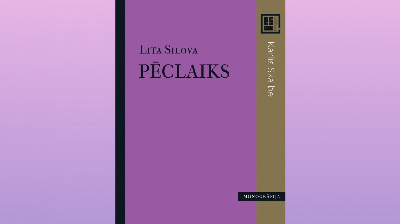
© Facebook Arvīds Deģis
У рамках авторитетної серії «Es esmu...» («Я є…») вийшла друком нова монографія — «Pēclaiks» («Повоєнний час»), присвячена постаті одного з найвизначніших латвійських письменників — Кірліса Скалбе. Авторка книги, літературознавиця, дослідниця та викладачка Літа Сілова, підкреслює: Скалбе — це митець, який «заслуговує, щоб його перечитували знову і знову». Книга стала спробою глибше осягнути образ письменника, відомого широкому загалу передусім завдяки казці «Млинці котика». Проте, на думку авторки, за цією популярністю часто губиться багатогранність його творчої спадщини: від філософської поезії до драматичних, і навіть еротичних казок, які виходять далеко за межі відомого образу «меланхолійного романтика». Монографія «Повоєнний час» поділена на три змістовні частини: біографічну, поетичну та казкову. Авторка звертає особливу увагу на еволюцію художнього стилю Скалбе, аналізує образи-прототипи з фольклору, а також досліджує його особисту містику та самотність. Назва книги — алюзія на збірку віршів самого Скалбе «Pēclaikā» 1923 року, яка, попри свій глибокий зміст, залишилася маловідомою навіть у Латвії. «Це книга про письменника, який умів іти серед людей — і залишатися самим собою. Про людину, яка шукала тишу в гаморі й ідеї в самотніх прогулянках. Його образ — це красива суперечність, де “гучне” і “тихе” співіснують одночасно», — зазначає Літа Сілова. Монографія стала органічним продовженням літературного діалогу з романом Свенса Кузміна «Красота і тривога», що зосереджується на юності Скалбе. Разом ці книги не просто повертають інтерес до постаті письменника, а й актуалізують дискусію про значення класичної літератури у сучасному культурному просторі Латвії.
Карліс Скалбе (1879–1945) — видатний латвійський поет, прозаїк, публіцист і громадський діяч. Народився 7 листопада 1879 року у селі Інцені, в нинішньому районі Вецпієбалга, у родині сільського коваля. Автор легендарної казки «Казка про млинці котика» (Kaķīša dzirnavas), яка стала символом латвійської літературної традиції. Учасник революції 1905 року, політичний емігрант, переслідуваний за свою діяльність. Деякий час жив у Фінляндії, Швейцарії, Норвегії. У роки Першої світової війни співпрацював із латвійськими періодичними виданнями та служив у стрілецьких частинах. Активно підтримував ідею незалежної Латвії, був членом Латвійської Нацради, депутатом Конституційних зборів і парламенту. У міжвоєнний період редагував літературні журнали та газети, очолював об’єднання письменників і журналістів. Після радянської окупації 1940 року вступив до Спілки радянських письменників Латвії, однак під час Другої світової війни змушений емігрувати до Швеції. Помер 16 квітня 1945 року в Стокгольмі. На його честь створено меморіальний музей у Вецпієбалзі, де зберігаються особисті речі та архів письменника. Його ім’я пов’язане з висловом «Татовіщині та свободі», що викарбувано на пам’ятнику Свободи в Ризі. Лауреат Ордена Трьох зірок та Ордена Великого князя Гедиміна.
New Monograph Pēclaiks Sheds Light on Kārlis Skalbe — A Pillar of Latvian Literature
As part of the prestigious Es esmu... (“I am…”) series, a new monograph titled Pēclaiks (“Aftertime”) has been released, offering a fresh and nuanced portrait of Kārlis Skalbe — one of Latvia’s most revered literary figures. Authored by literary scholar and educator Lita Silova, the book is a compelling call to rediscover an artist who, in her words, “deserves to be read again and again.” Best known to many readers for his fairy tale The Cat’s Mill, Skalbe is often remembered in a simplified light. Yet, as Silova argues, his creative legacy is far richer and more multifaceted — spanning philosophical poetry, emotionally charged prose, and even tales with a distinct erotic undercurrent. The monograph seeks to move beyond the sentimental image of the “melancholic romantic” and delve into the complexity of Skalbe’s literary voice. Structured in three parts — biographical, poetic, and folkloric — Pēclaiks explores the evolution of Skalbe’s style, recurring symbolic motifs, and the role of solitude and mysticism in his worldview. The title itself references the writer’s 1923 poetry collection Pēclaikā, a subtle but powerful work that remains relatively unknown, even in his homeland. “This is a book about a writer who could walk among people while remaining entirely himself,” Silova notes. “Someone who found inspiration in the quiet of solitude and the noise of the city alike. There is a beautiful contradiction in him — a coexistence of the loud and the silent.” Silova's Pēclaiks forms a thoughtful counterpart to Svens Kuzmins’ acclaimed novel Beauty and Dissonance, which focuses on Skalbe’s early years. Together, the two works reignite interest in the author and prompt a broader conversation about the place of literary classics in contemporary Latvian culture. Far from a nostalgic homage, Pēclaiks is a timely and intellectually invigorating reappraisal — a reminder that true literary voices do not fade with time; they simply wait to be heard anew.
Kārlis Skalbe (1879–1945) was a prominent Latvian poet, prose writer, publicist, and civic figure. He was born on 7 November 1879 in the village of Incēni, now part of the Vecpiebalga region, into the family of a rural blacksmith. He is the author of the legendary fairy tale "The Cat’s Mill" (Kaķīša dzirnavas), which has become a symbol of Latvian literary tradition. A participant in the 1905 revolution, Skalbe became a political émigré, persecuted for his activities. He spent time in Finland, Switzerland, and Norway. During the First World War, he contributed to Latvian periodicals and served in the Latvian Riflemen units. An ardent supporter of Latvian independence, he was a member of the Latvian National Council, a delegate to the Constitutional Assembly, and a deputy in the Latvian parliament. In the interwar period, he edited literary journals and newspapers and led associations of writers and journalists. Following the Soviet occupation of Latvia in 1940, he joined the Latvian Soviet Writers’ Union, but during the Second World War was forced to flee to Sweden. He died on 16 April 1945 in Stockholm. A memorial museum was established in his honour in Vecpiebalga, preserving his personal belongings and literary archive. His name is associated with the phrase "For Fatherland and Freedom", inscribed on the Freedom Monument in Riga. He was a recipient of the Order of the Three Stars and the Order of the Lithuanian Grand Duke Gediminas.

©
191